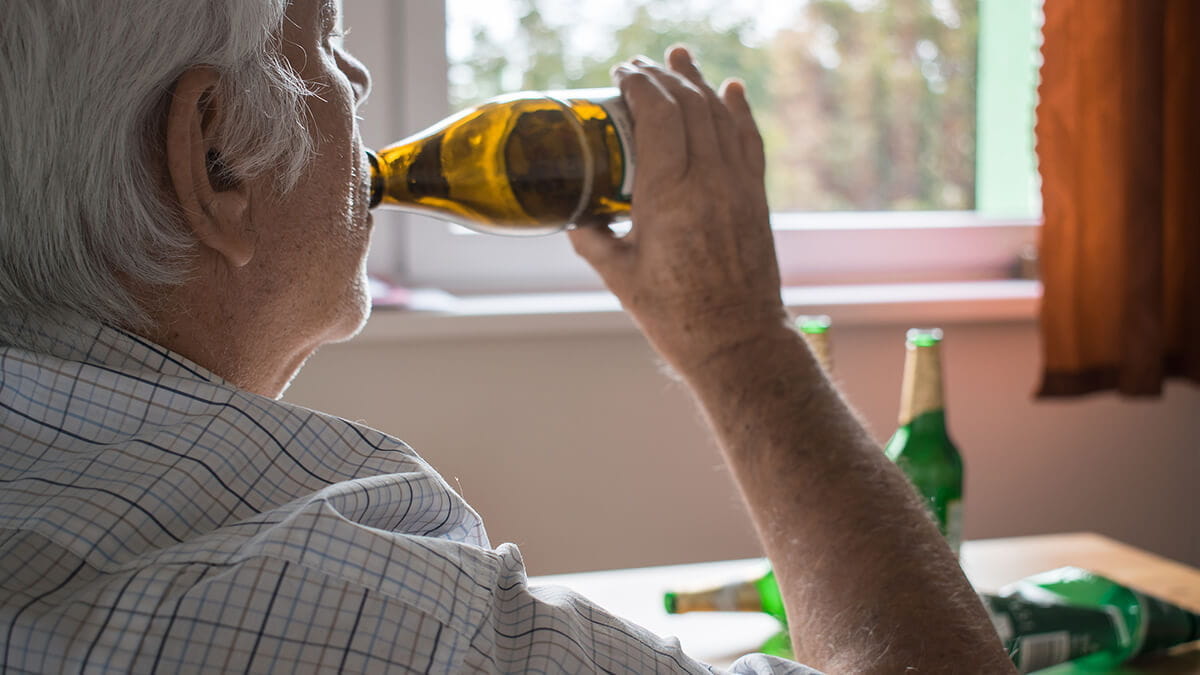Public health nurses help communities address COVID-19-related challenges.
In March 2020, as the COVID-19 pandemic triggered shelter-in-place orders, there was an early sign that a spike in U.S. alcohol consumption might be coming: For the week ending March 21, 2020, retail sales of alcohol were up 55% compared to the same week in 2019.1
Research now shows that during the virus outbreak, there have been more episodes of binge drinking for some Americans,2 while others surveyed report they have been drinking more often and more heavily.3
“Specific COVID-19-related stressors are related to alcohol consumption. This highlights the ancillary and unintended effects of the COVID-19 pandemic which could have long-lasting population health consequences,” according to research published in The American Journal of Drug and Alcohol Abuse (AJDAA) in January 2021.2
An Increase in Binge Drinking
In their AJDAA article “Longer Time Spent at Home During COVID-19 Pandemic Is Associated With Binge Drinking Among U.S. Adults,” authors Sitara Weerakoon, Katelyn Jetelina, and Gregory Knell reported that “more binge drinkers increased alcohol consumption during the pandemic (60%) than non-binge drinkers (28%).”2
“For every one-week increase in time spent at home during the pandemic, there was 1.19 greater odds of binge drinking,” they wrote. “Additionally, binge drinkers with a previous diagnosis of depression and current depression symptoms had greater odds of increased alcohol consumption compared to those reporting no depression.”2
A Spike in ‘Heavy Drinking’ Episodes
A Rand Corp. study, “Changes in Adult Alcohol Use and Consequences During the COVID-19 Pandemic in the U.S.,” found that women surveyed had dramatically increased their heavy-drinking episodes, defined as “four or more drinks within a couple of hours.”3
“For women, there was also a significant increase of 0.18 days of heavy drinking, from a 2019 baseline of 0.44 days, which represents an increase of 41% over baseline. This equates to an increase of one day for 1 in 5 women,” survey authors Michael Pollard, Joan Tucker, and Harold Green Jr. wrote.4
Additionally, the survey found that compared to the prior year, the overall frequency of alcohol consumption increased by 14% among adults over 30, 19% among all adults ages 30 to 59, 17% among women, and 10% among non-Hispanic white adults.4
“Alcohol consumption can have significant negative health consequences, so this information suggests another way that the pandemic may be affecting the physical and mental health of Americans,” Rand senior sociologist Pollard wrote.3
Building Healthier Communities
These are some of the trends that public health nurses and other public health professionals may encounter as they work to address COVID-19-related issues in their communities. The Centers for Disease Control and Prevention (CDC), which identifies healthcare access and quality as a key social determinant of health, seeks to expand access to substance abuse treatment as part of its Healthy People 2030 initiative.5
If you’re an RN who’d like to serve a broader community, you can prepare for maximum impact by earning a Master of Science in Nursing (MSN) degree with a Public Health Nursing specialization. Walden University, No. 1 in Master of Science in Nursing graduates in the U.S.,6 offers an online MSN degree program that can give you the flexibility to advance your education while staying engaged in your career and with friends and family.
Walden University’s online MSN degree program is accredited by the Commission on Collegiate Nursing Education (CCNE), an autonomous accrediting agency that ensures the quality and integrity of baccalaureate, graduate, and residency programs in nursing.
During your Walden MSN journey, you’ll develop leadership skills you can use as a public health professional. You’ll explore global health issues and experience engaging coursework and learning technologies. And you’ll apply what you’ve learned in a practicum project that addresses a real-life issue.
The Walden MSN program is available in two tracks: the BSN to MSN track, for registered nurses entering the program with a Bachelor of Science in Nursing (BSN), and the RN to MSN track, for registered nurses entering the MSN program with a hospital diploma or an associate degree in nursing. A Walden Enrollment Specialists can help you get started.
When you’re ready expand your reach into the vital field of public health nursing, you can find the knowledge and tools you need in an MSN public health nursing online degree program.
Walden University is an accredited institution offering a Master of Science in Nursing (MSN) online degree program with a Public Health Nursing specialization. Expand your career options and earn your degree in a convenient, flexible format that fits your busy life.
1Source: https://twitter.com/nielsen/status/1248366074317418498
2Source: https://pubmed.ncbi.nlm.nih.gov/33280423/
3Source: www.rand.org/news/press/2020/09/29.html
4Source: https://jamanetwork.com/journals/jamanetworkopen/fullarticle/2770975
5Source: https://health.gov/healthypeople/objectives-and-data/browse-objectives/health-care-access-and-quality
6Source: National Center for Education Statistics (NCES) IPEDS database. Based on the most recent year of completions survey data available, using CIP code family 51.38 “Registered Nursing, Nursing Administration, Nursing Research, and Clinical Nursing” for Master’s degrees (Award level 7). Available at https://nces.ed.gov/ipeds/use-the-data. (Retrieved January 2021; may consist of or include provisional release data.)
The baccalaureate degree program in nursing (BSN), master’s degree program in nursing (MSN), and Doctor of Nursing Practice (DNP) program at Walden University are accredited by the Commission on Collegiate Nursing Education (www.ccneaccreditation.org).
Walden University is accredited by The Higher Learning Commission, www.hlcommission.org.




